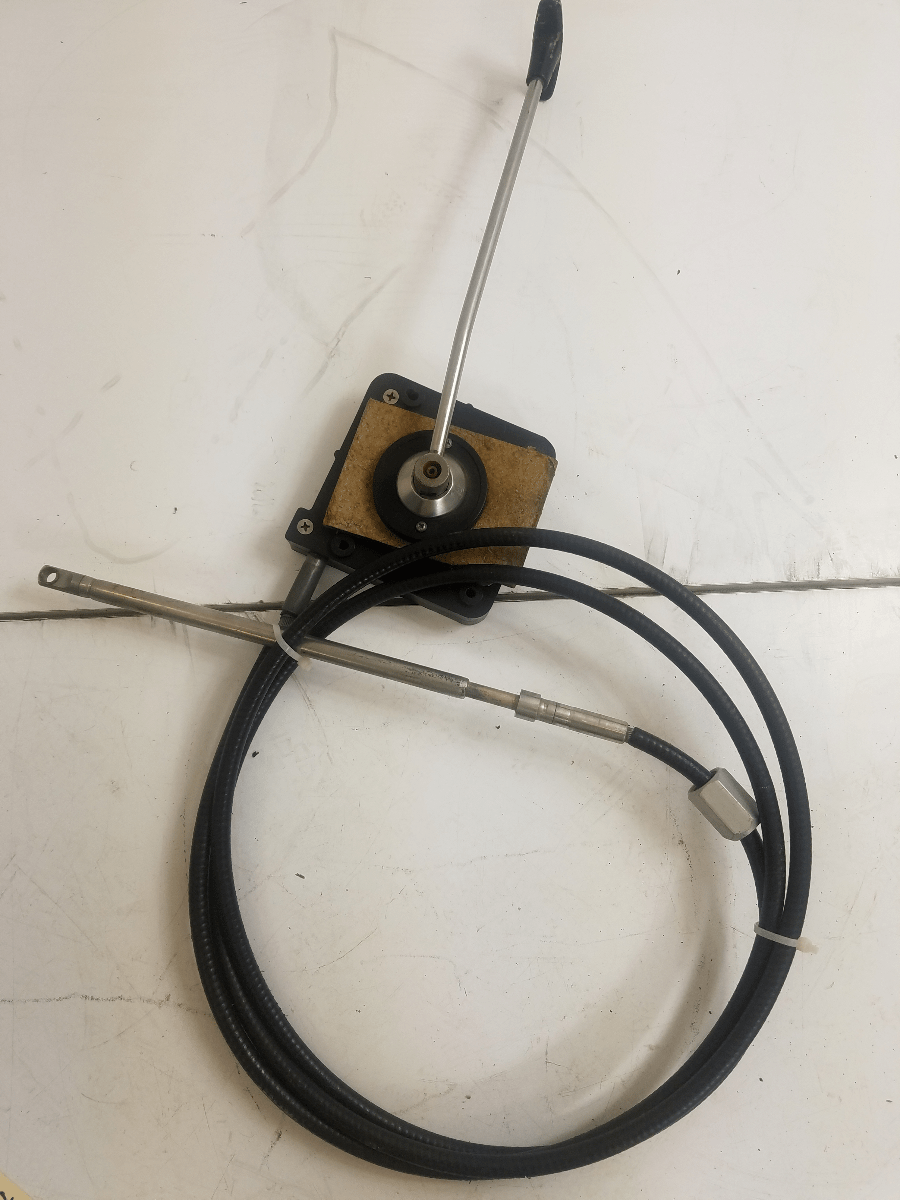Outboard Steering Cable Blues? Time for a Change

That sticky, unresponsive steering on your outboard? Yeah, we've all been there. It's like trying to steer a shopping cart with a wobbly wheel, except instead of awkwardly bumping into canned goods, you're risking a serious boating mishap. This isn't just annoying; it's a safety hazard. And it usually points to one culprit: your outboard steering cable.
So, you're thinking about tackling an outboard steering cable replacement? Smart move. A properly functioning steering system is non-negotiable for boat control and safety. This isn't some esoteric marine mechanic voodoo; it's a manageable DIY project for most boat owners. Let's dive into everything you need to know about getting your steering back in tip-top shape.
Outboard motors have been around for over a century, and so has the need for reliable steering. Early systems were rudimentary, but as outboards grew in power and boats became more sophisticated, so did the steering mechanisms. The modern teleflex steering cable, the most common type, offers a relatively simple yet effective way to translate your helm movements into directional control. However, these cables are susceptible to corrosion, wear and tear, and damage from improper use or maintenance.
Ignoring a faulty steering cable is like ignoring a flashing check engine light in your car. It's a ticking time bomb. A stiff, unresponsive, or completely seized cable can leave you stranded, unable to maneuver in tight spaces, or worse, cause a collision. That relaxing day on the water can turn into a nightmare quickly if you don't address this crucial component.
Steering cable issues manifest in several ways. You might notice increased resistance when turning the wheel, a "dead spot" in the steering range, or a grinding or clicking sound emanating from the helm or the outboard. If you experience any of these symptoms, it's time to inspect your steering cable and consider replacing it.
Changing your outboard's steering cable involves removing the old cable from both the helm and the outboard motor, routing the new cable along the same path, and securing it properly. It's a somewhat intricate process, but with patience and the right tools, it's achievable. A new steering cable will dramatically improve your boat's handling and responsiveness, providing a safer and more enjoyable boating experience.
Benefits of Steering Cable Replacement
1. Enhanced Safety: A responsive steering system is paramount for avoiding collisions and navigating safely, especially in crowded waterways or challenging conditions.
2. Improved Control: Say goodbye to wrestling with the wheel. A new cable ensures precise and effortless steering, giving you complete command of your vessel.
3. Peace of Mind: Knowing your steering system is reliable allows you to relax and enjoy your time on the water without worrying about potential mechanical failures.
Step-by-Step Guide for Outboard Steering Cable Replacement
1. Disconnect the old cable at the helm and the outboard motor.
2. Carefully route the new cable along the same path as the old one.
3. Secure the cable at both ends, ensuring proper tension and alignment.
4. Lubricate the cable according to the manufacturer's instructions.
5. Test the steering system thoroughly before heading out on the water.
Advantages and Disadvantages of Replacing Your Steering Cable
| Advantages | Disadvantages |
|---|---|
| Improved safety and control | Cost of the new cable and potentially labor |
| Enhanced boating experience | Time investment for the replacement process |
| Prevents further damage to the steering system | Potential for difficulties during installation |
FAQs
1. How often should I replace my steering cable? It depends on usage and environmental conditions, but generally every few years is a good idea.
2. Can I replace the steering cable myself? Yes, with the right tools and some mechanical aptitude.
3. What are the signs of a bad steering cable? Stiff steering, grinding noises, and a "dead spot" in the steering range.
4. What tools do I need for steering cable replacement? Wrenches, pliers, screwdrivers, and potentially specialized marine tools.
5. How do I choose the right steering cable for my outboard? Consult your outboard's owner's manual or a marine supply store.
6. What is the average cost of a new steering cable? Prices vary depending on the length and type of cable.
7. How long does it take to replace a steering cable? It can take a few hours, depending on the boat's setup.
8. Where can I buy a replacement steering cable? Marine supply stores, online retailers, and boat dealerships.
Tips and Tricks:
Take photos or make notes of the cable routing before disconnecting the old cable. This will make installing the new one much easier. Lubricate the cable regularly to prevent corrosion and extend its lifespan.
Replacing your outboard steering cable is not just about maintenance; it's about safety, control, and peace of mind. A well-maintained steering system is essential for a pleasurable and safe boating experience. Don't let a worn-out cable ruin your day on the water. Take the time to inspect your steering system regularly and address any issues promptly. Investing in a new cable and taking the steps to replace it will ultimately save you headaches, potential danger, and ensure you can enjoy countless hours of smooth sailing. This proactive approach ensures a safer and more enjoyable experience, allowing you to fully embrace the joys of being on the water. So, don’t wait until your steering becomes a liability, take control and ensure smooth sailing ahead. Invest in a new cable, follow the proper procedures, and enjoy the confidence that comes with knowing you’re in command of your vessel.
Medicare part b prescription drug coverage explained
Elevate your space exploring the world of wood look wallpaper
Ford super duty platinum fog lamps illuminating the beast












